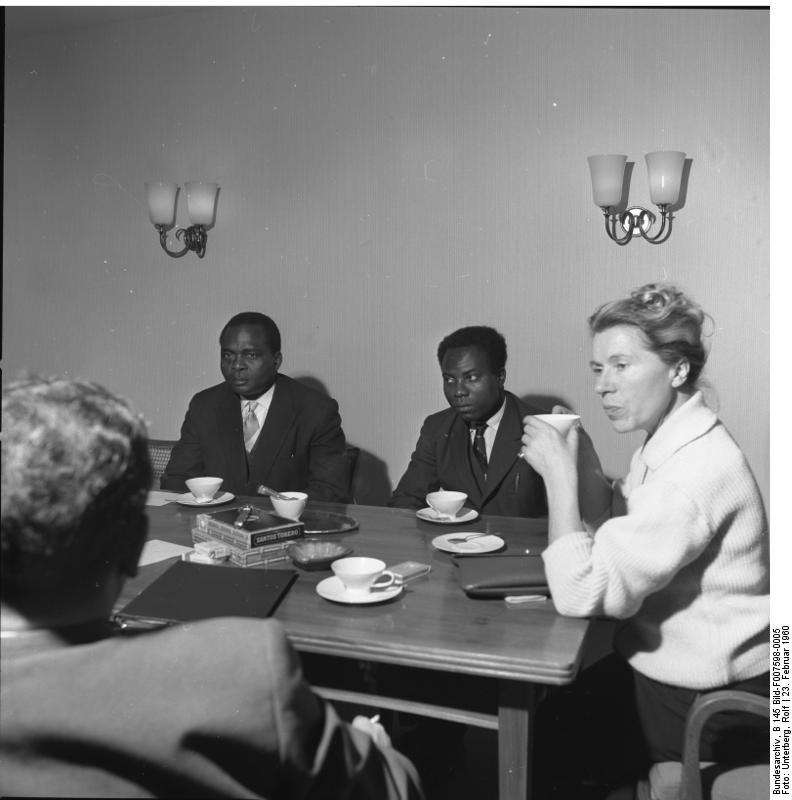Jean Bolikango
Jean Bolikango in 1960
Jean Bolikango Akpolokaka–Nzube (February 1909 – 22 February 1982) was a prominent Congolese educator, social figure, and politician. Bolikango began his career in the Belgian Congo as a teacher in a Catholic school, and became a prominent member of Congolese society as the leader of a cultural association. In the late 1950s he became involved in politics, founded his own political party, and in 1960 unsuccessfully ran to be the first President of the independent Republic of the Congo. He remained a relevant politician the rest of his life, retiring from the government in 1980 and dying two years later.
Biography
Jean Bolikango was born in Léopoldville, Belgian Congo in February 1909 to family from the Équateur province. He received his education in Catholic schools run by CICM Missionaries. In 1926 he became a licensed primary school teacher.[1] He taught at St. Joseph's Institute of the St. Anne's Catholic mission until 1958, instructing a total of 1,300 students. In 1946 he became the president of the Association des Anciens élèves des pères de Scheut (Association of Former Students of the Fathers of Scheut), a position he held until his death.[2]
Bolikango worked closely with missionary Raphaël de la Kethulle de Ryhove to establish the Union des Interets Sociaux Congolais, (UNISCO), a cultural society for Congolese elites.[1] The organization was viewed favorably by the colonial administration for its attachment to Belgian social ideals, though it would later become a forum for revolutionary politics.[3] Bolikango first went abroad when he attend Kethulle de Ryhove's funeral in Belgium in 1956.[1] In 1958 he went to Brussels to represent Catholic education at an exhibition and became the first General Information Commissioner for the Belgian Congo and Ruanda-Urundi. The following year he served as an assistant professor of Bantu language speech therapy at the University of Ghent.[2]
In 1960 Bolikango started his own newspaper, La Nation Congalaise. He also left the Mouvement National Congolais (MNC), where had led the conservative wing, and founded the Front de l'Unite Bangala, a political party representing the Bangala people of the northeastern Congo. Later that year it was reformed into the Parti de l'Unite Nationale (PUNA) in an attempt to garner more national appeal, but it retained its regional bias and failed to amass substantial outside support.[1] He did, however win the position as deputy of the Mongala province in an election by 15,000 votes.[2] He ran as PUNA's nominee to be the first President of the Republic of the Congo in early 1960,[4] facing Joseph Kasa-Vubu of the Alliance des Bakongo (ABAKO). Patrice Lumumba of the MNC originally wrote a pledge of support to Bolikango, in exchange for his backing in the general government election. Once Lumumba realized that the Belgians would only allow him to be prime minister if Kasa-Vubu held office, he switched allegiances and denounced Bolikango as a "pawn of Belgium and a protégé of the Catholics." Bolikango lost the parliamentary vote 43 to 159.[5] He also made a bid to be president of the National Assembly, but lost the Assembly vote to Joseph Kasongo, 74 to 58.[6]
During the Congo Crisis that followed Congolese independence, Lumumba was dismissed from office by Kasa-Vubu and replaced with Joseph Ileo. During Ileo's short term, Bolikango served as his deputy prime minister. He then acted as the third deputy to Prime Minister Cyrille Adoula.[7] In that capacity, Bolikango helped to mediate negotiations between Adoula and secessionist figure Moïse Tshombe.[2] Following Joseph Mobutu's seizure of power in 1965, he became the Minister of Public Works. In 1968 he was appointed to the political bureau of the Mouvement Populaire de la Révolution (MPR), joining its central committee in 1980 and leaving the government. He died of an illness on 22 February 1982.[2][4]
Legacy
The Fondation Jean Bolikango (Jean Bolikango Foundation) was created by Bolikango's grandson, Joseph Bolikango Bopolo, in his memory. The foundation focuses on supporting social progress and education.[2]
On 22 February 2007 a ceremony was held in the Équateur province to commemorate the 25th anniversary of Bolikango's death.[2]
Citations
- 1 2 3 4 LaFontaine 1986, p. 218
- 1 2 3 4 5 6 7 "In mémoriam: Jean Bolikango: 25 ans déjà". Digital Congo (in French). Kinshasa: Multimedia Congo s.p.r.l. 22 February 2007. Retrieved 27 November 2016.
- ↑ LaFontaine 1986, p. 155
- 1 2 Kisangani 2016, p. 104
- ↑ Frindethie 2016, p. 220
- ↑ American University Foreign Areas Studies Division 1962, p. 344
- ↑ "FOREIGN RELATIONS OF THE UNITED STATES, 1964–1968, VOLUME XXIII, CONGO, 1960–1968: Persons and Pseudonyms". Office of the Historian. United States Department of State. Retrieved 30 November 2016.
Bolikango, Jean, leader of Parti de I’Unité National (PUNA); Vice Premier in the lleo Ministry; Third Vice-Premier in the Adoula Ministry
References
- Frindethie, K. Martial (2016). From Lumumba to Gbagbo: Africa in the Eddy of the Euro-American Quest for Exceptionalism. McFarland. ISBN 9780786494040.
- Kisangani, Emizet Francois (2016). Historical Dictionary of the Democratic Republic of the Congo (4 ed.). Rowman & Littlefield. ISBN 9781442273160.
- LaFontaine, J.S. (1986). City Politics: A Study of Léopoldville 1962–63. American Studies. Cambridge University Press Archive.
- Republic of the Congo (Leópoldville). Area Handbook. 1. Washington D.C.: American University Foreign Areas Studies Division. 1962.
